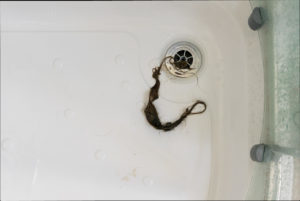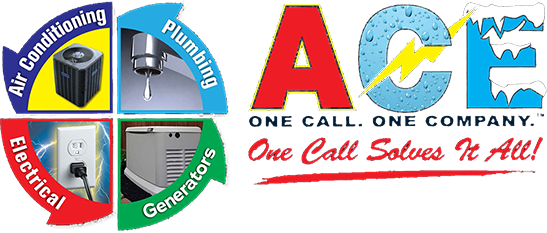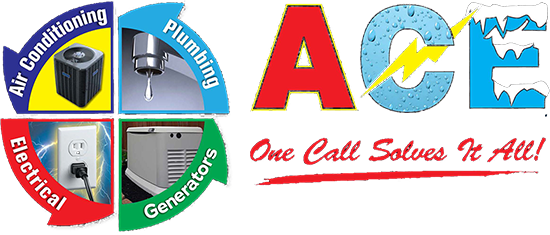Have you ever flushed the toilet and water just fills the bowl instead of draining? Ever run the garbage disposal and the sink fills up with stinky, disgusting water and food? Do you hate standing in backed-up water in the bathtub during a shower? It’s time to put an end to your home’s drain clogs once and for all.
Drain clogs show up when you least expect them, but in most cases, the blockage has been gradually building up for weeks and months. As more and more debris accumulates in your home’s pipes, they eventually become too clogged for water to pass efficiently out of your home and into the municipal sewer line or septic tank.
Let’s look at what causes drain clogs and how to fix them.
What Are the Most Common Types of Drain Clogs?
Drain clogs can happen to the best of us, even if you try to avoid them. Knowing what commonly causes clogged drains will make them much less of a problem to deal with – whether you fix it yourself or hire a company like us to get them cleared.
Ace Solves It All frequently sees drain clogs in the following places:
- Kitchen sinks: You might be surprised what things shouldn’t be put down the drain, even if you’ve been told it’s okay – especially if you have a garbage disposal. Grease, for instance, goes into a kitchen sink piping hot, cools, and forms a gel that cakes your pipes and blocks water and debris from flowing past it. Anything that’s a fat, oil, or grease (FOG) should never be put down the sink.
- Toilets: There are only a few things that should go in a toilet. Things like flushable wipes, even if they say they’re flush-friendly, should never go down the toilet. Neither should feminine products. They get caught on whatever else might be building up and cause a clog that leads to a messy bathroom situation.
- Main drains: Many older homes are still using cast iron drain pipes. These degrade and corrode over time, eventually leading to failure in combination with a drain clog. The older your home is, the more likely it is that your main drains will burst if a clog begins to build and isn’t cleared quickly.
Your bathroom sinks, bathtub, and anywhere in your home that pipes run to and from can be affected by drain clogs. Clogs that happen further down your pipes can cause issues in multiple areas of your home, and you wouldn’t even realize it until a plumber discovers the source of the clog.
What Causes Drain Clogs?
 Here are some of the common ways you end up with a drain clog:
Here are some of the common ways you end up with a drain clog:
- Hair and Fur: Human hair and pet fur combine with soap scum to form a dense, sticky substance that causes major clogs.
- Food Scraps: Tea leaves, eggshells, coffee grounds, and rice destroy your pipes whether you have a garbage disposal or not. These food scraps lead to obstructed drains very quickly and will cause your sink to drain slowly, eventually overflowing back into the sink.
- FOG: Fat, oil, and grease are the most common culprits for clogged drains. These solidify in your pipes when they cool down and are very hard to break down and clear once formed. Everything else catches in it, causing an even bigger clog.
- Mineral Buildup: If your home has hard water issues, minerals from that water builds up over time in your pipes and creates limescale. That buildup eventually “catches” everything else draining through the pipe, leading to a clog.
- Paper Products: Toilet paper, “flushable” wipes, tampons, and other paper products wreak havoc on your home’s pipes, leading to nasty clogs that often come back up the way they went down.
- Soap Scum: Soap scum is another huge source of clogged drains. As soap residue goes down your drain, it sticks to the interior of your pipes, often tangled up with hair, creating a nasty clog.
Some of the most common household items you don’t think about that cause drain clogs include:
- Band-Aids
- Cigarettes
- Dental floss
- Dryer sheets
- Q-Tips
- Wet wipes
Anything that goes down the drain can cause and add to an existing clog. Although we do sometimes find foreign objects that go down the drain and immediately create clogs, this is not as common. Instead, it’s usually a slow buildup of waste over time that leads to clogs which require the help of a professional like Ace Solves It All to clean up.
Signs of a Drain Clog
Here are some of the most common signs you’re dealing with a drain clog:
- Unusual odors from sinks or drains
- Toilet or sink bubbling or gurgling
- Water backs up into your toilet, bathtub, shower, or sink
- Water leaks from your toilet or under the sinks
- Water slowly drains down a sink
Of the above causes, strange smells, slow draining sinks, and odd noises from your sink or drains are the most common signs a clog is causing issues with water flow.
How Do You Unclog a Drain?
For hundreds of years, homeowners have used different methods to unclog drains. From plungers to Draino to snakes and more, plumbers and homeowners have been trying to find new ways to combat drain clogs. The technology behind drain clearing hasn’t really changed much over the years.
Professional Services
- Drain Cleaning: Drain cleaning is the process of removing blockages from drains and pipes. This can be done with various methods, including chemical cleaners, plungers, or even a high-pressure water jet. In some cases, the blockage may be too severe for a plunger or drainage snake to remove. In this case, a high-pressure water jet can be used to blast the obstruction away.
- Hydro Jetting: Hydro jetting is a process that uses high-pressure water to clean and remove debris from pipelines, sewer lines, and other underground infrastructure. The water is forced through the pipe at a high velocity, which loosens and removes any buildup or obstruction. Hydro jetting also flushes out any foul odors or bacteria that may be present in the line.
DIY
- Over-the-counter drain cleaners, like Drano and Liquid Plumber*: Drain cleaners are a homeowner’s go-to when they notice a slow drain. Many of these products are caustic and can cause long-term damage to your pipes.
- Do-it-yourself drain cleaners, like vinegar and baking soda: There are holistic solutions on Reddit, forums, and home improvement websites. While these may have anecdotal evidence that they work, they can make a drain clog worse.
- Plungers: This item is a staple in all households and is used to unclog toilets and sinks where necessary.
- Snakes: Over-the-counter crank snakes can be purchased at places like Home Depot or Lowes. If you don’t know how to use one, you will damage your pipes and cause much more harm than good.
* Ace Solves It All firmly believes homeowners should stick to just plunging their sink or toilet and avoid any over-the-counter or DIY products. There is no real magic in a bottle to eliminate drain clogs without a plumber determining the root of the problem and the right course of action to eliminate the issues discovered.
Many of us try to prevent drain clogs, but they’re bound to happen to everyone eventually – no matter how hard you try to avoid bad things from going down the drain. Leaving a clogged drain to worsen over time will eventually damage your pipes, causing thousands of dollars in damage to your home and can even lead to water and sewer lines bursting from the buildup.
Ensuring you and your family do everything you can to avoid putting things down the drain that you shouldn’t is the first step to preventing drain clogs. Tackling drain clogs as soon as you start noticing them is important to stop serious damage to a home. By taking care of clogs as soon as they form, you will avoid costly repairs and damage to your home.
If you’re not sure where to start with drain clogs, contact Ace Solves It All today. We can answer questions, schedule service, and help ensure your clogged drains are cared for once and for all.


